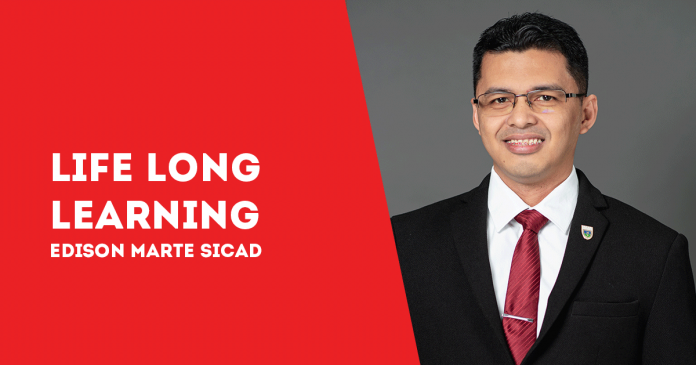
BY EDISON MARTE SICAD
BY AUTHORITIES I mean those who are mandated by law— and maybe, also driven by personal interest or ulterior motive—to facilitate learning. I specifically refer to subject teachers. These are the employees in a private or public school who give regular classroom discussions and periodic assessments: all in the name of quality education (Si ma’am kag si sir).
I call them authorities because somehow, the ebb and flow of learning, the amount of schoolwork, and the general impression or appreciation about education, depend on their strength of character, the nearness of payday, and the spiciness of gossips available. It’s their call.
But this article is not about them. This is about you, my dear student, who, by now, could be thinking about them (Or not. Who cares?). But regardless of the effectiveness of their performance, I would still give this advice: don’t blame them if there were those who were not able to deliver what was promised: quality education—and to a certain extent, employment readiness.
Despite the broken promises—and “ego-tripping of the gods” (teachers tremble when they visit)—thank them. Be grateful to those who were able to inspire you and lead you to the right path.
But what if none (heaven forbid) among all your teachers inspired you? Or worse, having teachers who (to hell with it) were tyrants, narrowminded, and all-knowing-self-righteous?
Nevertheless, when it comes to your learning, take charge; be in control of your future. And when you choose to have this kind of mindset, you will feel a sense of responsibility that gives you power—and freedom. For that’s what knowledge—and education—is all about in the first place (Or you may disagree).
***
“The impulse to dream was slowly beaten out of me by experience. Now it surged up again and I hungered for books, new ways of looking and seeing.” –Richard Wright
If you still don’t have a reading habit, challenge yourself to read one book covet to cover. A thin book (this would somehow be subjective) of about 200 pages would be a good start. Fiction or nonfiction.
To those who are already into reading, you may aim higher: read a 500-page or 1000-page book.
To those who wanted a more holistic approach, read a book that defends an issue or position that you do not support: read a writer whose views you opposed (vehemently). Or you can start reading books tackling another discipline or field of knowledge: if you are into philosophy, read a book about science or math.
All knowledge is actually one: a unifying whole of human experience and discovery: the natural tendency of man in his evolving process. For everything are sourced from us humans, although animated or inspired by different stimuli.
Reading as a way of life or spending your free time is education and learning at will.
Read to discipline your mind and as a form of meditative exercise.
Read to encounter the richness of human intellect and folly. For there are many so-called books that are mere trash. So be careful with what you read. As they say, “Garbage in, garbage out.”
And above all, read in order to widen your perspective and get an almost mystical or transcendental appreciation of life.
Dyer said, we are not human beings having a spiritual experience. We are spiritual beings having a human experience.
In reading—or meditating— we get to see things in a different and bigger perspective. Our daily experiences, difficulties, and problems can all be considered as part of the learning process.
We get to know human greatness despite the perennial human weakness. Or it could also be the other way around. That despite the chaos and filth of human existence, life can still flourish in all its grandeur. That our life is worth living—and sharing.
In a sense, you are your best teacher. For with growth comes maturity—the expectation that you have matured—whether you like it or not. And with this, the ability—or burden—to make decisions.
For education is the power to learn; and teaching is the empowerment of learning. Therefore, the best education, in the long run, is self-taught. And the best learning is lifelong learning. In my case, a lifetime of reading—and eventually, of writing—books./PN



